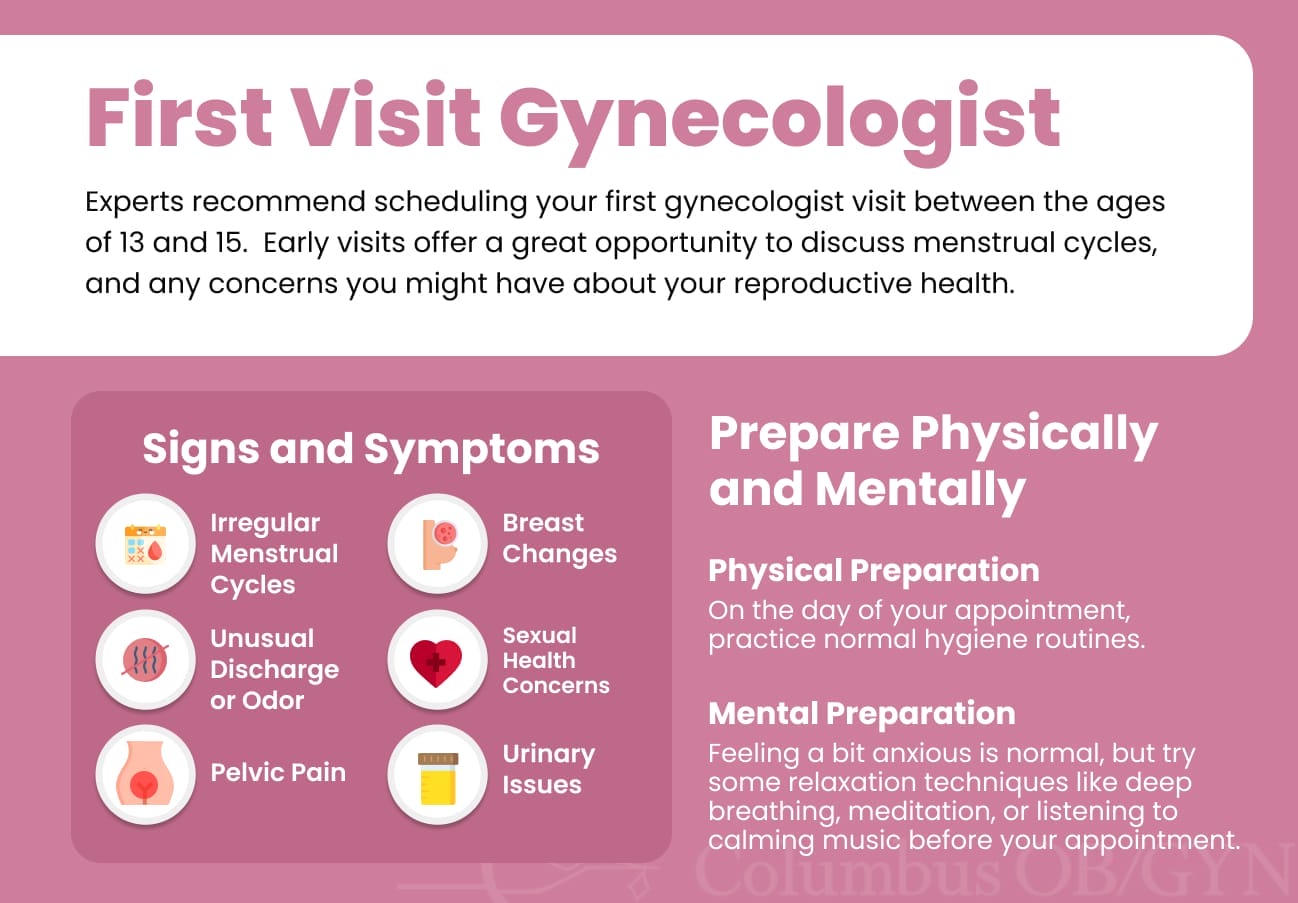

While it’s beneficial to start gynecological visits at a young age, there are specific signs and symptoms that necessitate a visit to the gynecologist regardless of age. These include:

Preparing for your first gynecologist visit involves a bit of planning so you have everything you need for a smooth experience. Here’s a list of essential items to bring:
Physical Preparation
On the day of your appointment, practice normal hygiene routines. A shower or bath is sufficient; there’s no need for special cleaning or douching, as these can disrupt your vaginal environment and are generally not recommended by health professionals.
Wear comfortable, easily removable clothing. You’ll likely be asked to undress from the waist down, so consider wearing a skirt or pants that are easy to take off and put back on.
Feeling a bit anxious is normal, but try some relaxation techniques like deep breathing, meditation, or listening to calming music before your appointment. Understanding what to expect during the visit can significantly reduce anxiety. Familiarize yourself with the general process of a gynecological exam, including the pelvic exam and any other procedures that might be part of your visit.
If it makes you feel more comfortable, consider bringing a trusted friend or family member to accompany you. Their presence can provide emotional support and help you feel more at ease.
Your first gynecologist visit is an excellent opportunity to ask questions and gather information about your health. Here are some important questions to consider:
When you arrive for your first gynecologist visit, the initial consultation will set the tone for the rest of your appointment. Your gynecologist will introduce themselves and explain the purpose of the visit. This introduction is your opportunity to express any concerns or ask preliminary questions.
Your gynecologist will ask about any chronic illnesses, surgeries, allergies, and current medications. This information helps them understand your overall health and identify any potential risk factors. Plus, they will ask about your family medical history, focusing on conditions related to reproductive health, such as breast or ovarian cancer.
Your gynecologist will also ask about the age when you first got your period, the regularity of your cycles, and any symptoms you experience, such as cramps or mood swings. This information helps them assess your reproductive health and identify any potential issues that may need attention. If you are sexually active, your gynecologist might ask about your sexual activity, contraception use, and any concerns you have about sexually transmitted infections (STIs).
Your gynecologist will also ask about your diet, exercise habits, stress levels, and any substance use, such as smoking or alcohol consumption. By the end of the consultation, you should feel more informed and reassured about your reproductive health, with a clear understanding of the next steps and any follow-up appointments needed.
During your first visit, your gynecologist will ask about:

A physical examination is an essential part of your first gynecologist visit. This exam helps your gynecologist assess your overall health and identify any potential issues.
Depending on your age and health history, your gynecologist might perform a Pap smear during the pelvic exam. This test involves collecting cells from your cervix to screen for cervical cancer and other abnormalities. The procedure is simple and only takes a few minutes.
Consider factors like their experience, communication style, and reviews from other patients. You can also ask for recommendations from friends or family members. Feeling at ease with your doctor makes the entire process much more comfortable.
Your first gynecologist visit is a significant step towards taking control of your reproductive health. By understanding what to expect, preparing thoroughly, and communicating openly, you can make the experience positive and empowering.
Remember, your gynecologist is a valuable partner in your health and well-being, and this first visit is just the beginning of a proactive approach to your health.